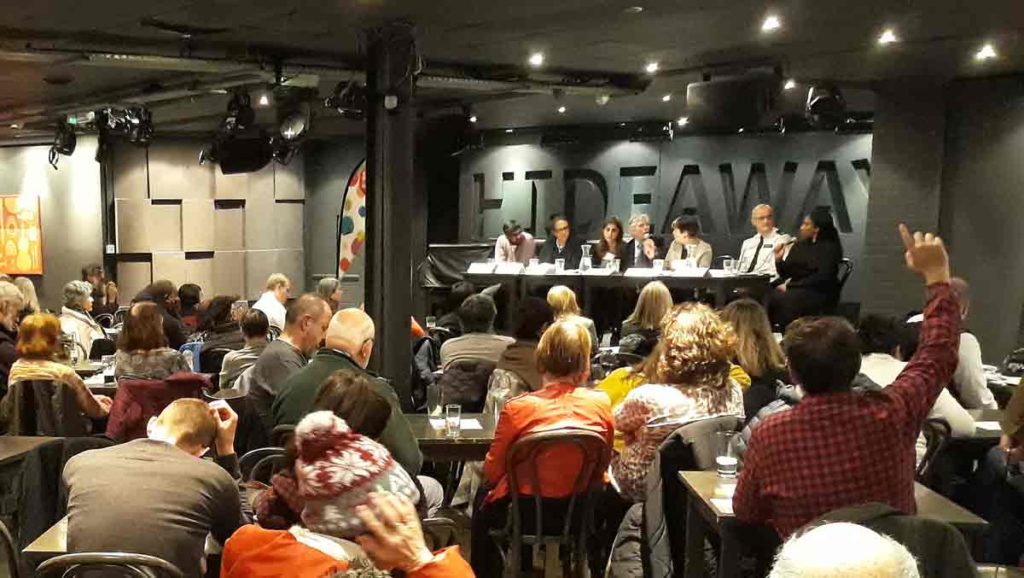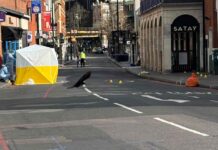
Two of London’s 12 bail hostels are in Lambeth, a meeting of more than 100 Streatham residents heard last week.
They also heard and expressed concerns about why the attacker in the terror attack in the town centre was placed in a bail hostel in Streatham and how, once there, he was able to make a fake suicide vest, and the ease and speed with which he stole a knife on Streatham High Road.
 Organised by Streatham Action, central Streatham’s leading civic group, the meeting heard from representatives of the police, probation service, Lambeth council and local MP Bell Ribeiro-Addy.
Organised by Streatham Action, central Streatham’s leading civic group, the meeting heard from representatives of the police, probation service, Lambeth council and local MP Bell Ribeiro-Addy.
Alex Vine, chair of the community forum, said residents received welcome assurances that the circumstances of the attack were exceptional.
“I would also like to reinforce the tributes made at the meeting to the bravery shown by members of the police and ambulance services on 2 February,” Vine said.
But he added Streatham Action was concerned “that some serious questions could not be answered at the meeting”.
Neil Salt, vice chair of Streatham Action, said: “We appreciate that some of these outstanding issues need to await the coroner’s inquest, but it is crucial that lessons are being learned and action taken now to reduce the likelihood and impact of any repeat attack for any local community.”
He said the organisation had three questions:
WAS THE DECISION TO PLACE THE OFFENDER IN STREATHAM THE RIGHT ONE? What were the decision-making processes used by the probation service that led to a released prisoner on licence with the highest level of risk assessment being placed in an approved premises [bail hostel] in such a busy urban environment.
WAS THE MONITORING OF THE OFFENDER WHILE IN THE STREATHAM BAIL HOSTEL ADEQUATE? How was it possible that somebody with the highest level of overall risk assessment, who should have been very closely monitored in approved premises in Streatham, was allowed to purchase the materials for, and make, a fake suicide vest?
WHY WAS THE OFFENDER ABLE TO GET ACCESS A WEAPON SO EASILY? Only a few minutes separated the offender being able to steal a knife on open display in a shop and the stabbing of the first victim in Streatham High Road. The group’s view is that this suggests current controls over the sale of knives and blades are inadequate.
Streatham Action supports local MP Bell Ribeiro-Addy’s call for the government to limit the type of shops allowed to sell sharp knives.
It is also urging the government to legislate for a level of security in the sale of knives that is the same as that for cigarettes – controlled from behind a counter.
Panel members at the meeting in The Hideaway jazz club were
- Superintendent Ian Howells, neighbourhood lead for Lambeth, Metropolitan police
- Kilvinder Vigurs, divisional director, National Probation Service (NPS), London
- Mary Pilgrim, head of public protection, NPS London
- Bell Ribeiro-Addy, MP for Streatham
- Annie Hudson, strategic director for community safety, Lambeth council
- Cllr. Mohammed Seedat, cabinet member for community safety, Lambeth Council
The meeting was chaired by local resident Charles Hymas, home affairs editor of the Daily Telegraph and former managing editor (news) at the Sunday Times.
Supt. Howells said the second of the two victims who were stabbed – the first having been released from hospital soon after the attack – is now “in a stable condition in hospital”. He expressed confidence that the attack was “an isolated incident”.
Kilvinder Vigurs and Mary Pilgrim were keen to impress upon the meeting that NPS does not eliminate risk, but manages risk alongside the police.
They explained that the delivery of this key responsibility is performed by multi-agency public protection arrangements (MAPPA).
MAPPA has been on a legal footing since 2000 with probation, prisons and the police as the responsible authority and local authorities having a duty to co-operate.
Vigurs explained that local authorities were often involved in high risk cases, on the basis of their duty to co-operate with MAPPA.
Cllr. Seedat said the leader of Lambeth council has not yet received a reply to his open letter to the Home Secretary of 6 February raising concerns about MAPPA and questioning why local authorities are not included as statutory partners.
A senior representative from the Streatham Islamic Centre, who was only 40 metres away from the scene of the stabbing incident, praised the police’s speedy action, while questioning the panel as to what level of de-radicalisation was taking place in prisons to assess Islamic extremists before their release. No panellist was able to answer that question with any level of specifics.
The meeting stimulated many questions from the audience and from a community safety perspective in particular.
Mary Pilgrim confirmed that there are 100 “approved premises” (bail hostels) located across the UK and that they “vary in size”. She went on to confirm that 12 of these approved premises are in London, with 2 in Lambeth.
This provoked a question as to why 16.5% of approved premises in London are located in Lambeth.
The meeting was aware that one of these premises is located at the top of Leigham Court Road near to its junction with Streatham Common Northside.
The other is near the top of Tulse Hill at its junction with Upper Tulse Hill.
Pilgrim stressed to people concerned about living near bail hostels that “many have been there for years and serious incidents are rare”.
A former longstanding Streatham Wells councillor told the meeting that not once in his 20 years as a councillor had any issues been raised about the Leigham Court Road hostel.
Bell Ribeiro-Addy made clear her objections to the official Prevent programme which is supposed to identify and to divert people from terrorism before they offend.
She said the programme had failed. “It has demonised the wrong people and hasn’t worked to de-radicalise people”.
She said a de-radicalisation programme is needed.
Cllr Seedat, speaking on behalf of his Lambeth council cabinet colleagues, said the programme “needs review”.
Answering an audience member who expressed shock that it took the assailant “60 seconds to take a knife” from a small local hardware shop, Ribeiro-Addy confirmed her wish for changes in the law on the sale of knives.
A Streatham Action committee member asked how it was that somebody with a very high overall risk assessment, who was consequently very closely monitored, in the approved premises in Streatham, was allowed not only to purchase the materials required to make a fake suicide vest, but also subsequently to assemble it.
Pilgrim said that “approved premises have regular room searches”. An internal review is taking place.
Both Annie Hudson, on behalf of Lambeth council, and Supt. Howells were keen to stress how important local communities are in information flow.
Not only did the local authority have a duty to work with local community groups, they said, but the police also depend on community intelligence – which may be given anonymously – for their day-to-day work.




